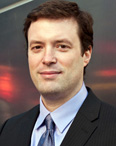Word Routes
Exploring the pathways of our lexicon
Remembering "The Voice of God"
A great voice was silenced earlier this week with the death of Bob Sheppard, longtime public-address announcer for New York Yankees baseball games and New York Giants football games. Sheppard, who also worked as a speech teacher at the high school and college level in New York, had such a memorable way of announcing players' names that he was fondly known as "the voice of God."
If you haven't had a chance to enjoy Sheppard's elegant vocal stylings, get thee to YouTube and listen to his recreation of the 1951 World Series lineup introduction, his announcement of a moment of silence after the death of Robert F. Kennedy, or his reminder to fans that they should refrain from disorderly conduct. At Major League Baseball's All Star Game on Wednesday, Sheppard's voice was heard yet again when the Yankees' Derek Jeter came to bat.
Sheppard wasn't the only announcer to have earned the "voice of God" moniker. Possibly the first was John Facenda, the narrator of NFL Films from 1966 until his death in 1984. Facenda was also sometimes called "the voice of Doom" — he sounded particularly doomful reciting "The Autumn Wind," a poem about the Oakland Raiders written by NFL Films chief Steve Sabol. After Facenda, Philadelphia Phillies broadcaster Harry Kalas took over the "voice of God" duties for NFL Films until his death last year, though he never quite achieved Facenda's stentorian heights.
Yet another "voice of God" was Don LaFontaine, who narrated thousands of film trailers, many beginning with his signature phrase, "In a world..." Sadly, we now live in a world without Don LaFontaine, as he died in 2008. Two "voices of God" who are still with us are the actors James Earl Jones and Morgan Freeman. Jones's voice has of course been used for Darth Vader and CNN's tagline "This... is CNN," but he also earned some godly cred by narrating an audio-book version of the King James Bible. Freeman, meanwhile, has actually played God in the movies "Bruce Almighty" and "Evan Almighty."
What all of these voices share is a baritone richness that would make just about anything sound stately and profound. These vocal marvels are also careful enunciators, no more so than Sheppard, who was a speech teacher at St. John's University and John Adams High School in the borough of Queens. The Boston Globe's obituary quoted a 2000 interview with Sheppard in which he said, "I would rather be known as a good teacher of speech rather than as a public address announcer. It's more important to me in my life. People don't know of me as a teacher. They think, 'Oh that's the guy who works at Yankee Stadium 81 days a year.' That's shortsighted."
New York schools no longer have speech teachers like Sheppard, as elocution (the study of formal speaking encompassing pronunciation, intonation, and gesture) has become something of a lost art. His passing thus marks the end of an era, a final vestige of an approach to spoken language that has now been largely abandoned. But the recordings of his voice will always serve as a reminder that a meticulous focus on enunciation and diction can sometimes result in something divine.
Update: I discussed Sheppard's "old-timey" diction on WNYC's The Brian Lehrer Show (starting about 2 minutes into the segment).


